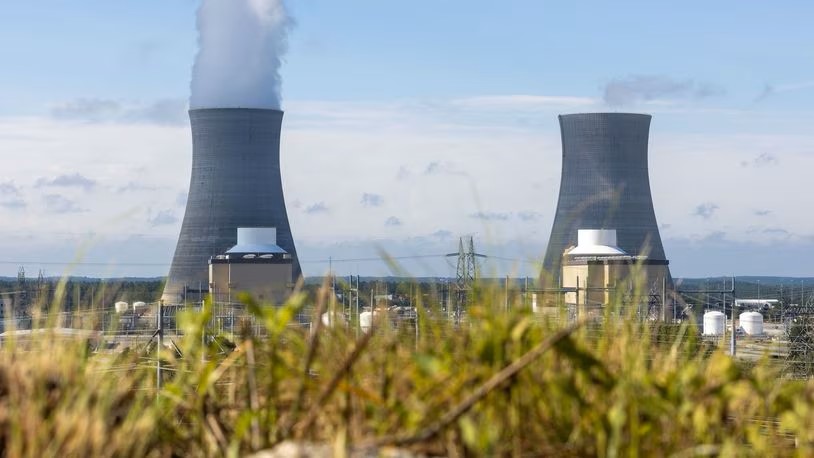By Drew Kann, The Atlanta Journal Constitution —
Georgia Power, staff for the Georgia Public Service Commission (PSC) and several consumer advocacy groups have reached a deal that could pass $7.6 billion in remaining Plant Vogtle expansion costson to ratepayers, the parties announced Wednesday.
The tentative agreement is not finalized and still must be approved by the five PSC commissioners tasked with regulating the utility. But the settlement provides a preview of the final plan on which the commission is likely to sign off.
The first of Vogtle’s new units finished 7 years late and the second new reactor is more than 6 years behind schedule. The total price tag has swelled to more than $35 billion.
According to the terms of the deal — filed at the same time as the company’s formal application to recover its costs — Georgia Power would be allowed to collect around $7.6 billion in outstanding construction costs from its customers, with the company’s shareholders picking up the rest of the tab. The amount the company is requesting is less than the $10.2 billion the company expects to ultimately spend on building the two new reactors. But it is far more than the $4.4 billion in construction costs forecast when the project began more than a decade ago.
If the plan is approved by the commission, Georgia Power says the average residential customer will see their bills go up by almost $9 per month. That rate hike would take effect the month after the second new nuclear reactor on the site, Unit 4, begins providing electricity to Georgians. The company has said that is likely to happen later this year or in early 2024.
Those rate hikes would remain in place until at least 2025, when they could be adjusted by the PSC. But Georgia Power customers are likely to be paying at least some amount for Vogtle’s expansion in their monthly bills for the entire life of the reactors, which the company estimates will be 60 to 80 years.
Ratepayers have already been paying for Vogtle for years now, long before either unit produced any electricity. By the time Unit 4 is complete, the PSC’s staff has estimated the average residential customer will have paid almost $1,000 for the project. That’s double what they would have paid if the reactors had been finished on time.
The commission will take a final vote on the cost allocation at the end of a set of “prudency hearings.” It was not immediately clear when those hearings would begin, but they are likely to kick off in the next few months.

Georgia Power owns the largest share of the new units at 45.7%, followed by Oglethorpe Power (30%), the Municipal Electric Authority of Georgia (22.7%) and Dalton Utilities (1.6%).
In addition to Georgia Power and the PSC staff, several other consumer protectiongroups involved in litigating Vogtle’s costs signed onto the agreement, including Georgia Watch, Georgia Interfaith Power and Light, the Partnership for Southern Equity and the Georgia Association of Manufacturers.
Nathaniel Smith, the chief equity officer for the Partnership for Southern Equity, acknowledged that while many customers will be paying for Vogtle’s costs for decades, the settlement was “a significant step in advancing our pursuit for energy equity and democratizing energy for many Georgians.”
The tentative deal includes some provisions to try to lessen the price shock facing customers, particularly those who are elderly or low-income.
Georgia Power agreed to expand its Income-Qualified Senior Citizen Discount program, which saves the average eligible customer $33.50 on their monthly bills, according to the Southern Environmental Law Center (SELC). Seniors in households with a combined income equal to or less than 200% of the federal poverty level were already eligible for the discount; now, customers receiving Social Security Disability assistance, Supplemental Security Income and customers who use the Section 8 housing voucher program will also qualify. The changes are expected to expand eligibility to another 96,000 customers, the SELC said.
The company also agreed to expand its energy efficiency program offerings starting in 2025.
The settlement gives Georgia Power a hard deadline of March 31, 2024 to place Unit 4 into commercial service. If the schedule slips beyond that date, the company’s rate of return will be slashed to zero until it is complete.
The deal includes other protections for ratepayers.
If Unit 3 or Unit 4 do not perform as expected at any time after their first year in service, Georgia Power will have to prove to the PSC that any interruptions aren’t the result of engineering and construction errors or other mistakes. If the company fails to meet that burden of proof, commissioners could order it credit customers for the costs.
Not all parties involved in monitoring the Vogtle saga were pleased with the agreement.
Bryan Jacob, the solar program director for the Southern Alliance for Clean Energy, said in a statement that though the settlement helps limit ratepayer impact, it did not go far enough to “protect ratepayers from costly mistakes like Vogtle in the future.”
PSC Chairman Jason Shaw did not comment on the specifics of the deal, but thanked his staff for their work monitoring the Vogtle expansion.
“The culmination of construction on this historic project marks the expansion of clean energy production for another 60 to 80 years here in Georgia,” Shaw said in a statement.
The deal comes amid a flurry of developments at the nuclear power plant in Waynesboro, 30 miles southeast of Augusta.
In late July, Unit 3 made history when it was placed into commercial service, becoming the first new nuclear reactor built from scratch in the U.S. in more than 30 years. Earlier this month, its twin, Unit 4, began loading fuel into the reactor core, a key step on its path to completion. Unit 4 is expected to begin splitting atoms inside its reactor in the coming weeks.
Once complete, the two units combined will produce enough electricity to power roughly 1 million homes, without contributing additional heat-trapping greenhouse gases to the atmosphere.
Copyright © 2023 The Atlanta Journal Constitution


